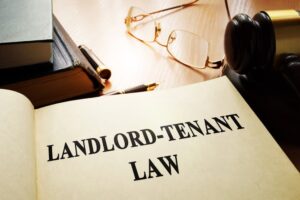What is Florida Implied Warranty of Habitability?
Florida Attorneys
Serving You and The State of Florida
In Florida, tenants have an implied warranty of habitability. In simple terms, this means that rental units must be furnished with the essentials required to live comfortably. It is the landlord’s legal responsibility to maintain the safety and habitability of rental properties.
The right to a habitable dwelling is implicit in any agreement between a landlord or tenant. No written lease agreement needs to exist for a tenant to have the right to have their basic needs met.
If your landlord is stripping you of this essential right, call our St. Petersburg tenant attorney today at 727-933-0015 for a case evaluation.
The Right to a Liveable Dwelling is Non-negotiable

If a lease agreement clause attempts to waive a tenant’s essential rights, the contract will default to state law, and the clause will not apply. Any attempts to waive a tenant’s rights to habitable dwellings will not hold up in court, an important factor to remember in the event of self-help eviction.
What Does the Implied Warranty of Habitability Include in Florida?
The Florida Implied Warranty of Habitability includes but is not limited to the following.
The Right to Peaceful Living
Under the Florida Residential Landlord-Tenant Act, tenants have the right to private, peaceful living, meaning that a landlord may not disturb them at their dwelling. They may not enter the rental unit without proper notice of inspection or consent from the tenant—the only exception to this rule is an emergency circumstance such as a flood.
Likewise, landlords may not harass a tenant by contacting them repeatedly, especially in an informal manner such as knocking on the door at inappropriate hours.
Landlords must also exercise their power to keep the rental property at a reasonable noise level. If other tenants on the property repeatedly make excessive noise at unreasonable hours, the landlord must resolve the issue.
The Rental Unit Must be Habitable and Equipped with Functioning Utilities
All rental units must come equipped with essential utilities such as running hot and cold water, electricity, and heating. Additionally, the premises must have a reasonable level of security, including functioning locks on doors and functioning windows.
If the property is a single-family home, the landlord is responsible for installing and maintaining smoke detectors. Some multi-family properties may require the landlord to install and maintain smoke detectors. Housing and building codes dictate whether a landlord must install smoke detectors.
Landlords must also abide by local health and safety regulations. Rental units must be pest-free and safe for habitation. If any pests such as mice or rats, cockroaches, bedbugs, ants, or termites are found on the property, the landlord must hire an exterminator if necessary and offer a rent discount as compensation. Note that these rules may not apply to single-family dwellings or duplexes.
The Building Must be Structurally Safe
In addition to essential utilities, rental properties must not pose any hazards to the tenant. Roofs and windows must effectively keep out snow and rain, and floors and walls must not be liable to cave in or collapse.
The building should also have no chemical hazards. Toxic chemicals such as asbestos and lead must be removed from the property before the tenant moves in. Toxic mold must also be removed.
The Landlord Must Maintain the Property Overall
Landlords must foot the bill for any property maintenance repairs and complete maintenance requests from tenants. They must maintain any common areas in the rental property, such as parking lots, hallways, laundry rooms, hallways, stairwells, and entryways. Common areas must also be structurally sound and clean.
A Note on Minor Repairs
Although frustrating, a failure to fix minor or cosmetic damage to a rental property is not considered a habitability violation. So long as the tenant can safely occupy the property, the landlord is not breaching the law. A squeaking door or chipped paint may be annoying to live with, but they do not put the tenant in any immediate danger health and safety-wise.
Omitted Properties
Implied warranty of habitability does not apply to all Florida properties. Properties such as fraternities or sororities and RV parks are not covered, nor are hotels. Mobile homes and condos are covered if a renter is occupying the unit.
Implied Warranty of Habitability Does Not Cover All Amenities
Unless otherwise stated in the lease, the landlord does not have a legal obligation to offer and maintain certain non-essential amenities.
The following amenities are not included in the implied warranty of habitability:
- Providing trash cans and trash removal service (only for multi-family units)
- Providing a mailbox
- Providing kitchen appliances and washer/dryers
The following amenities are not explicitly addressed in the implied warranty of habitability:
- Functioning gas lines for utilities
- Functioning and safe fire exits
- Ensuring the safety of storage units such as garages and basements, ensuring neither contain combustible materials
- Providing wiring for a telephone jack
- Providing carbon monoxide detectors
The Right to Eviction Notice
All tenants are entitled to proper notice of eviction whether their lease has expired, they are a holdover tenant, or are guilty of a lease violation. Periods for eviction notices vary based on the tenant’s circumstances.
If the tenant has violated the lease, the landlord may issue them a notice to comply or quit, which means that the tenant will have a period to comply with the landlord’s orders or vacate the property. Common lease violations include multiple noise complaints, illegal activity on the premises, unauthorized pets, property damage, and unauthorized subletting. Note that if the tenant is guilty of unlawful activity on the premises, there is no option to remedy the issue. The tenant must evacuate the premises.
If a lease has no fixed expiry date, the landlord or tenant must issue a notice to terminate it. According to section 83.57 of the Florida Statutes, either party must provide 60 days’ notice before terminating a yearly lease. Quarter-to-quarter leases require 30 days notice from either party, and month-to-month leases require 15 days’ notice. Week-to-week leases require seven days’ notice before termination.
If the tenant fails to remedy the issue or vacate the premises, the landlord must still go to court and file a formal eviction lawsuit to get them to leave. They may not take adverse action against the tenant to get them to vacate. Doing so is an illegal offense known as self-help eviction.
Beware of Self-Help Evictions
Self-help evictions are an informal method of evicting a tenant whereby the landlord takes adverse action against a tenant to drive them from the property. Self-help methods usually involve violating a tenant’s implied warranty of habitability to make the property unfit for living. Self-help methods often include:
- Changing the locks to block a tenant from entering the property
- Refusing maintenance requests to make the property uninhabitable
- Cutting off essential utilities
- Apprehending or damaging the tenant’s personal property
- Harassing the tenant
- Blocking access to amenities such as parking spaces
Regardless of lease violations or expiries, self-help evictions are illegal in Florida. If a landlord wants to evict a tenant refusing to vacate the property, they must file a lawsuit to do so.
Retaliation
Retaliation involves a landlord taking adverse action against the tenant to compromise their rental unit’s habitability. Retaliation is generally a response to a tenant exercising any of the following rights:
- Filing a complaint with a government agency regarding safety and building code violations
- Creating or joining a tenants’ association
- Withholding rent from landlords who refuse essential maintenance
- Taking legal action against a landlord
Florida law prohibits landlords from retaliating against a tenant who takes action to protect their habitation rights.
Anti-discrimination Law in Florida
Most states prohibit landlords from denying rental applications for discriminatory reasons. In Florida, it is illegal for landlords to discriminate against renters based on:
- Race
- Ethnicity
- Sex
- Gender
- Familial status
- Disability
- Religion
Note that anti-discrimination housing laws do not explicitly protect sexual orientation and gender non-conformity. Protection from discrimination for LGBTQ tenants remains unclear. However, cities may impose their own anti-discrimination laws to protect LGBTQ renters. Tenants and landlords alike should familiarize themselves with their city’s laws.
What Does Housing Discrimination Look Like?
It’s not always clear what constitutes discrimination. Just a few actions Florida anti-discrimination laws prohibit include:
- Discriminatory or offensive language
- Denying a tenant’s application for a discriminatory reason or a protected characteristic
- Refusing a disabled person’s application or refusing to provide them with proper accommodation
- Refusing applications from individuals with service animals
- Unjustly altering the terms of a lease based on a protected characteristic such as having children
- Segregating tenants in a discriminatory manner
To avoid issues, landlords should select the first qualified applicant to occupy the rental unit. Failing to do so might arouse suspicions regarding discrimination and may even lead to a lawsuit.
No-Pets Policy
Under the Americans With Disabilities Act, it is illegal for a landlord to deny an application or charge an additional fee to an individual with a service animal. Note that emotional support or therapy animals are not considered service animals under the act, and landlords have the right to ask for proof that an animal is indeed a recognized service animal. One example of a legitimate service animal is a seeing-eye dog.
What Can I Do if my Landlord Breaches the Implied Warranty of Habitability?

St. Petersburg Tenant Attorney, Sean Lopez
If your landlord fails to keep your rental unit liveable by ignoring maintenance requests, cutting off utilities, or otherwise, you are legally entitled to withhold rent from the landlord. If you wish to, you may be able to pay for repairs on your own dime and subsequently deduct the cost from your rent payment.
As the landlord would be violating the law, you are no longer bound to your lease agreement and may move out without notice. You will not be held responsible for future rent payments.
If you have suffered extensive hardship at the landlord’s hands, you may want to consider suing them for damages. Hiring an attorney is always advisable in this case, as most tenants who win their lawsuit have their attorney fees covered by the landlord.
Florida Habitation Lawyers
Everyone has the right to live safely and comfortably in Florida. You may be able to recover significant damages for your hardship.
Related:
Practice Areas
- Business Lawyers
- Residential Real Estate Lawyers
- Commercial Real Estate Lawyers
- DUI Lawyers in Florida
- Expunction and Sealing Lawyers
- Florida Clemency
- Injunction Lawyers
- Tenant Lawyers
- Landlord Lawyers
- HOA Lawyers
- Defamation Lawyers
- Eviction Attorneys
- Moving Company Dispute Lawyers
- Probate Lawyers in Florida
What Our Clients Say
A Godsend
Mr. Lopez was a Godsend and really helped me with my situation. Him and the entire firm were very diligent and helped speed the early stages of the process along due to a pressing situation. Throughout my experience working with the firm, they were always responsive and available any time I had a question or wanted to check on the state of affairs. Hopefully I won’t have to recommend Lopez Law Group to my friends or family, but if those unfortunate circumstances arise then there’s only one name I would trust. Thank you again for all your help!
Lopez Law Group Can See You Through Cases Like:
Don't See What You Need?
Lopez Law Group
700 7th Ave N, Suite A,
St. Petersburg, FL 33701
P: 727-933-0015
Business Hours
Mo, Tu, We, Th, Fr
Schedule a Call Back
Book a Consultation






















